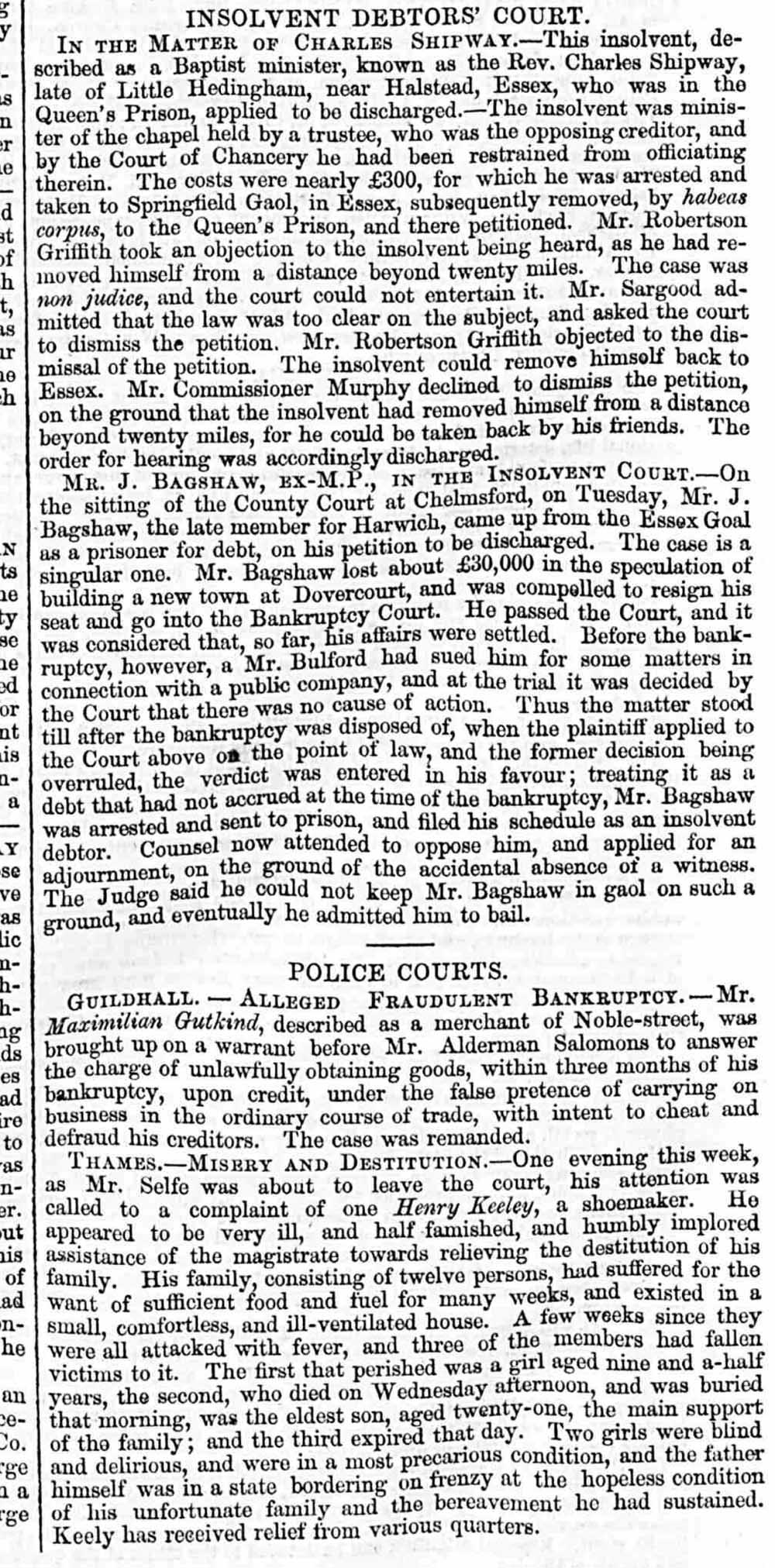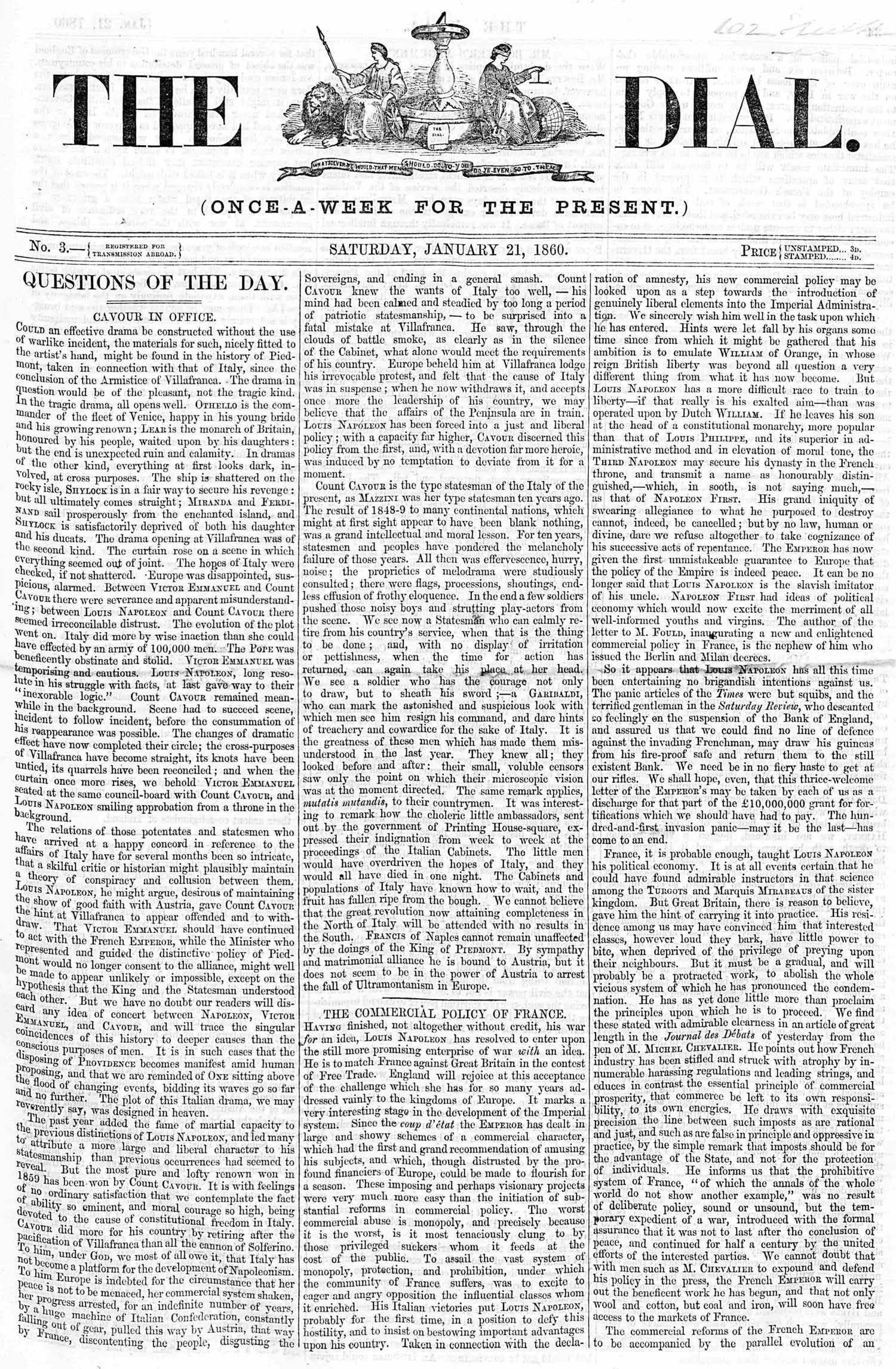Dial – Saturday 21 January 1860
INSOLVENT DEBTORS’ COURT.

IN THE MATTER OF CHARLES SHIPWAY.—This insolvent, described as a Baptist minister, known as the Rev. Charles Shipway, late of Little Hedingham, near Halstead, Essex, who was in the Queen’s Prison, applied to be discharged.—The insolvent was minister of the chapel held by a trustee, who was the opposing creditor, and by the Court of Chancery he had been restrained from officiating therein. The costs were nearly £300, for which he was arrested and taken to Springfield Gaol, in Essex, subsequently removed, by habeas corpus, to the Queen’s Prison, and there petitioned. Mr. Robertson Griffith took an objection to the insolvent being heard, as he had removed himself from a distance beyond twenty miles. The case was non judice, and the court could not entertain it. Mr. Sargood admitted that the law was too clear on the subject, and asked the court to dismiss the petition. Mr. Robertson Griffith objected to the dismissal of the petition. The insolvent could remove himself back to Essex. Mr. Commissioner Murphy declined to dismiss the petition, on the ground that the insolvent had removed himself from a distance beyond twenty miles, for he could be taken back by his friends. The order for hearing was accordingly discharged.
MR. J. BAGSHAW, EX-M.P., IN THE INSOLVENT COURT.—On the sitting of the County Court at Chelmsford, on Tuesday, Mr. J. Bagshaw, the late member for Harwich, came up from the Essex Gaol as a prisoner for debt, on his petition to be discharged. The case is a singular one. Mr. Bagshaw lost about £30,000 in the speculation of building a new town at Dovercourt, and was compelled to resign his seat and go into the Bankruptcy Court. He passed the Court, and it was considered that, so far, his affairs were settled. Before the bankruptcy, however, a Mr. Bulford had sued him for some matters in connection with a public company, and at the trial it was decided by the Court that there was no cause of action. Thus the matter stood till after the bankruptcy was disposed of, when the plaintiff applied to the Court above on the point of law, and the former decision being overruled, the verdict was entered in his favour; treating it as a debt that had not accrued at the time of the bankruptcy. Mr. Bagshaw was arrested and sent to prison, and filed his schedule as an insolvent debtor. Counsel now attended to oppose him, and applied for an adjournment, on the ground of the accidental absence of a witness. The Judge said he could not keep Mr. Bagshaw in gaol on such a ground, and eventually he admitted him to bail.
POLICE COURTS.
GUILDHALL.—ALLEGED FRAUDULENT BANKRUPTCY.—Mr. Maximilian Gutkind, described as a merchant of Noble-street, was brought up on a warrant before Mr. Alderman Salomons to answer the charge of unlawfully obtaining goods, within three months of his bankruptcy, upon credit, under the false pretence of carrying on business in the ordinary course of trade, with intent to cheat and defraud his creditors. The case was remanded.
THAMES.—MISERY AND DESTITUTION.—One evening this week, as Mr. Selfe was about to leave the court, his attention was called to a complaint of one Henry Keeley, a shoemaker. He appeared to be very ill, and half-famished, and humbly implored assistance of the magistrate towards relieving the destitution of his family. His family, consisting of twelve persons, had suffered for the want of sufficient food and fuel for many weeks, and existed in a small, comfortless, and ill-ventilated house. A few weeks since they were all attacked with fever, and three of the members had fallen victims to it. The first that perished was a girl aged nine and a half years, the second, who died on Wednesday afternoon, and was buried that morning, was the eldest son, aged twenty-one, the main support of the family; and the third expired that day. Two girls were ill and delirious, and were in a most precarious condition, and the father himself was in a state bordering on frenzy at the hopeless condition of his unfortunate family and the bereavement he had sustained. Keeley has received relief from various quarters.
Analysis of Life in the UK in the 1860s and the Editorial Tone:
This editorial offers a glimpse into the socio-economic conditions of the 1860s in Britain. It highlights issues such as insolvency, financial speculation, and widespread poverty, painting a picture of a society where financial ruin was a constant threat, even to public figures like former MPs. Legal bureaucracy appears rigid, with technicalities often determining the fate of debtors rather than any sense of compassion or practicality.
The piece also underscores the severe destitution faced by working-class families, such as that of Henry Keeley, who suffered greatly due to economic hardship and disease. The tone is formal and somewhat detached, characteristic of 19th-century journalistic styles, offering factual accounts without emotional embellishment. However, there is an underlying sense of social critique, particularly in the account of Keeley’s plight, which hints at the broader failings of public welfare systems.
Usefulness to Historians:
This editorial is valuable for historians studying Victorian social and legal history. It provides firsthand accounts of insolvency laws, debtors’ experiences, and the impact of economic hardship on families. It also offers insights into the legal proceedings of the period and the societal attitudes toward poverty and financial failure. Furthermore, the language and reporting style reflect contemporary journalistic practices and the moralistic undertones common in Victorian publications.
Dial was a short-lived newspaper, and pieces like this illustrate its focus on social justice, law, and morality, aiming to inform and educate readers rather than simply report events.
What was the history of Dial?

With the motto ‘Whatsoever ye would that men should do to you, do ye even so to them’, Dial was first published on 7 January 1860, priced at three pence. It aspired to establish itself as a “first-class London daily journal,” founded on the belief that “righteousness exalteth a nation.”
Dial was the brainchild of the National Newspaper League Company, whose objectives were outlined in the first issue. The company aimed to harness the power of the press in a manner previously unattempted, providing rigorous oversight in the national interest. Their stated mission was to deliver accurate information on political, social, and religious matters, cultivate informed public opinion, and contribute to the moral and intellectual development of the wider population.
With these lofty ambitions, Dial took a didactic approach, striving to maintain the highest standards of accuracy and integrity in its reporting. A notable feature was the ‘Ethical Column’, which ran alongside coverage of parliamentary reform, military and naval affairs, and literary topics.
Religious news was a central focus, with a dedicated section titled ‘The Religious World’. This segment provided updates from across Britain’s diverse Christian denominations, including the Church of England and the Primitive Methodists, alongside reports on religious developments abroad, such as those from China and Japan.
Victorian Hardship: Insolvency, Fraud, and Destitution in 1860s Britain #VictorianEra #History #DebtAndPoverty #Bankruptcy #UKHistory #Insolvency #SocialHistory #19thCenturyBritain #HistoricalNews #LondonCourtCases




